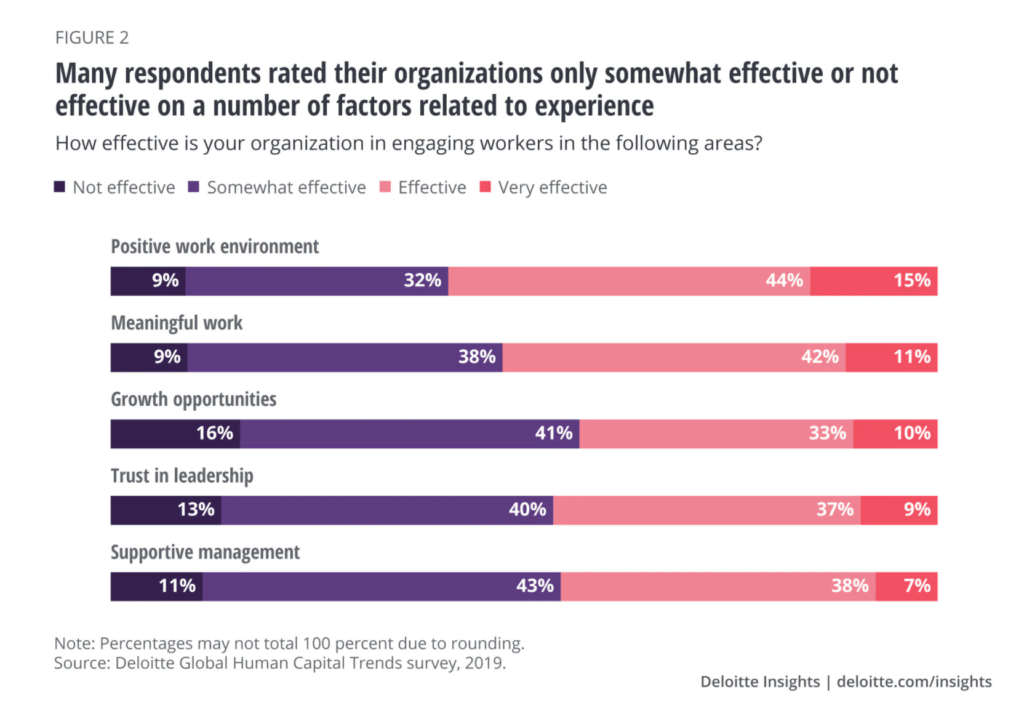Why Managing Employee Feedback is Important

Table of Contents
Employee feedback can be a valuable tool for improving the way you manage and lead your team, but only if you listen to it and act on it. Otherwise, you’re not getting anything out of your time invested in gathering feedback.
Without feedback, companies can’t adjust their work environment to accommodate their employees or know what needs to change in order to meet their objectives.

SOURCE: Deloitte Insights
Read on for tips on how to encourage your employees to provide you with better feedback, and how you can improve your business through employee experience.
Why feedback is important to your success
Getting feedback from customers is one of the most important things you can do for your business. It allows you to improve your products and services, and give your customers what they want.
Employee feedback works the same way. If employees are happy, they’re more likely to be productive, stay with the company longer, and refer their friends to work there too. When employees feel like their opinions matter, you’ll get more out of them than if you treat them like drones.
As an employer, it’s important to make sure everyone at your company knows where they stand. All companies should have clear goals about what’s expected of their employees, but it’s also vital that they know how they’re performing in relation to those goals.
While collecting employee feedback is important, it’s just as important to act on that information.
Employees will tell you what they need in order to be successful, so give it to them. They’ll appreciate that their opinions are being heard, and you’ll see better performance in return.
How to collect valuable information about your organisation
There are many ways to collect employee feedback. Some companies use eNPS surveys, while others rely on one-on-one conversations. Others choose the “360 degree” approach — soliciting feedback from employees’ peers and managers as well as their direct reports.
When it comes to employee feedback, you need to:
- Establish a framework for gathering and analysing appropriate feedback from employees.
- Provide appropriate training so everyone knows how to give and receive feedback.
- Create a system for your employees to give feedback about their own work or that of their peers.
- Promptly address negative feedback by following up with the employee who provided the information.
How to ensure the feedback you receive is valuable
If you’ve never asked for feedback from your employees, you’re missing out. Asking for feedback can help you improve your managerial skills, your company culture, and the overall performance of the company.
Before asking for employee feedback, there are a few key things to keep in mind. First, make sure you have someone on your team who is responsible for this process. If you’re the person in charge, it’s important to understand that employee feedback is a time-consuming task. It takes a lot of up front work to gain an understanding of what employees’ needs are and how they feel about their job.
In order to properly collect employee feedback, you need to know what your company wants from its employees, what’s going well and where improvements can be made.
There are many ways to collect employee feedback. You can speak to your employees directly; you can put up an anonymous suggestion box; or you can conduct surveys that allow your employees to submit feedback in writing.
There’s also a more modern way of gathering feedback: through online employee engagement tools like TRACX, which allows you to ask for anonymous feedback from your employees.
In most cases, it’s best to have a structured system in place for soliciting this kind of feedback from your staff. A well-designed employee feedback process is essential for giving your employees a voice as well as making sure they feel comfortable and safe with giving their opinions.
How to choose the right survey questions
Feedback is one of the most important aspects of improving company performance. It also can be hard, sometimes, to get honest feedback from employees. But there are ways to craft your feedback survey questions to get the best results.
Here are some tips for getting honest feedback from your employees:
- Use an anonymous method. You want honest answers, so don’t require your employees to identify themselves.
- The survey should be short. Your goal is to get information quickly and easily. The more questions you ask, the less likely employees are to respond.
- Ask specific questions about specific issues. This will help you determine whether or not you have a problem in a particular area, and it will help you identify what the problem is if you do have one.
- Use multiple-choice or rating scale questions where possible. These tend to be quick and easy for employees to answer, which will help ensure that they’ll participate at all. For example, you can ask “How likely are you to recommend your company as a good place to work?” and then on a scale of 1 to 5, give employees a choice between: very unlikely; unlikely; neutral; likely; very likely.
You also want to avoid making these common survey mistakes.
How to improve employee engagement
Employee feedback can be a valuable tool to boost engagement and improve overall employee performance. Giving employees a voice and a chance to give meaningful feedback is a great way to boost employee morale and reduce turnover.
But how do you get the most out of your feedback system?
Here are 4 ways to do it:
- Make sure your policy encourages feedback. Take the time to explain why you’re instituting this policy, what you hope to gain from it, and how you plan to use the information. Invite employees to ask questions about the program so they feel comfortable participating in it from the beginning.
- If your company culture is one that discourages people from voicing their opinions, you’ll have a hard time getting much useful feedback.
- Make it easy to give feedback. If employees have to jump through hoops to leave their input, they’re not going to bother. Make it as easy as possible for them by putting the feedback forms online or providing them with paper copies that they can submit without having to come into the office.
- Be consistent in how you collect and use feedback. If your employees don’t know what’s going on, they won’t be as likely to submit feedback or be as honest about it once they do. Make sure your employees understand exactly what the point of the program is and how you plan to use their responses.
- Always be fair. If an employee submits negative feedback about another employee, make sure both parties are treated fairly and neither feels singled out for any reason — including their job titles.
Key takeaways
Employee feedback is crucial to improving your company. Be open to suggestions, questions, and criticisms; it’ll make you stronger.
Giving and receiving feedback in the workplace is important if you want to grow and improve. The goal of giving and receiving feedback is to create an environment where people can grow and learn from each other, and if that’s the case, you should always be open to constructive criticism.
The best way to ensure that everyone feels comfortable giving feedback is to make sure that you’re open to it yourself. As a business owner or manager, you should be aware of all the things that are going wrong in your business.
Take time every day to go over employee performance reviews, survey results, or customer complaints, and ask yourself how your company can do better next time.
If you’re serious about improving employee morale and overall performance at your company, consider implementing a formal feedback process.
This feedback could come in many different forms:
- Employee surveys can be conducted at regular intervals to evaluate employee satisfaction with benefits, company culture, training programs, etc.
- On-the-spot peer-to-peer feedback can help employees learn from each other and improve overall performance by pointing out strengths and weaknesses.
- Employee advisory boards can provide another perspective on how your company is doing and give employees a chance to share any ideas they have for improvements.

Tom Sutton
Co-founder, TRACX
Tom is the co-founder of TRACX, a no-code marketing platform that allows local business owners to collect customer feedback and create engaging marketing campaigns. With over 17 years of experience in entrepreneurship, product development, and marketing for businesses large and small, Tom is currently responsible for developing product and marketing strategies for TRACX.